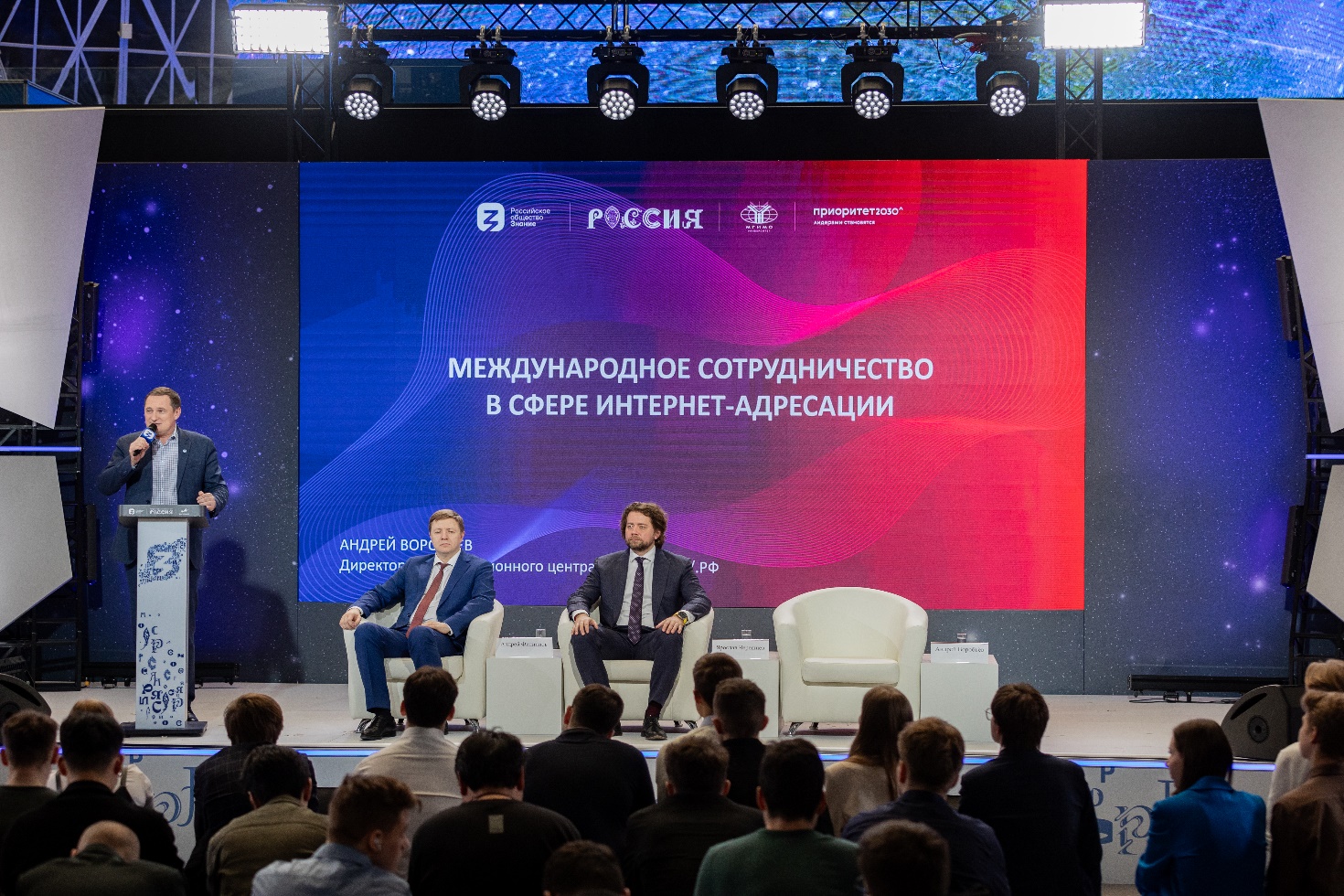
On March 1, in Hall 34 “Cosmonautics and Aviation” of VDNKh, within the framework of the International Exhibition and Forum “Russia” with the support of the Russian Society “Znanie” and the “Priority 2030” program, representatives of MGIMO of the Russian Ministry of Foreign Affairs together with experts from the Coordination Center for TLD .RU/.РФ, ANO "Digital Economy", Institute of System Programming named after V.P. Ivannikov RAS, as well as representatives of PJSC Sovcombank, opened a series of MGIMO events “Creating the MGIMO Digital Faculty together!”
During the Conference “Digital in the Science of International Relations” they discussed the digital transformation of science, education and the financial environment, Artificial Intelligence and big data in international relations, as well as the training of diplomats of the future. In addition, the issue of current international cooperation in the field of cybercrime prevention was raised.
The event began with welcoming words and wishes for success in holding the conference from the Chairman of the State Duma Committee of the Russian Federation on Science and Higher Education Sergei Kabyshev and the Director of the Institute of System Programming of the Russian Academy of Sciences, Academician Harutyun Avetisyan.
Sergei Shitkov, Vice-Rector for Legal, Administrative Affairs and Digitalization of MGIMO Ministry of Foreign Affairs of Russia, spoke in his speech about the creation of the new Digital Faculty of MGIMO and the ecosystem of digital education and science at MGIMO in the context of the digital transformation of Russian diplomacy, as well as the analysis of big data in international relations. “Our Rector, Academician of the Russian Academy of Sciences Anatoly Torkunov announced plans to create a Digital Faculty, the graduates of which will become real professionals. This is the foundation for further development. Digitalization of a university is, first of all, its content, training of specialists for whom working in a digital environment will become the norm. And we plan to introduce digital disciplines not only within its framework, but also into all educational programs,” he noted.
Then, Oleg Pichkov, Dean of the Faculty of International Economic Relations of the MGIMO Ministry of Foreign Affairs of Russia, in his report raised the topic of the influence of digital technologies on the modern world economy and international economic relations: “We are taking steps into the world of the fourth industrial revolution, the processes are beginning before our eyes. The emergence of end-to-end digital technologies that permeate all industries and segments will be used everywhere. We see a shift away from industrial development, we want more individuality. All this will be through the prism of digital technologies and digitalization, and this is what will be taught at the new faculty, among other things.”
Director of the Coordination Center Andrey Vorobyev spoke about international cooperation in the field of Internet addressing. He introduced the audience to international organizations operating in this industry and about the work of the Coordination Center. He also noted that the .RU is one of the five leading national domains in the world, and this year it turns 30 years old. Festive events will be dedicated to the anniversary throughout 2024. He also spoke about the security ecosystem of the Russian national domain zone, which includes, among other things, large Center’s projects: Netoscope and Domain Patrol. “At the end of 2023, the Domain Patrol system received about 55,000 requests, as a result of which 98% of domains were blocked. The vast majority of requests were related to phishing, which is on the rise throughout the world,” he said.
The conference was continued by Andrey Filippov, Deputy Director for International Cooperation, ANO Digital Economy. He spoke about the compiled rating of countries for the priority promotion of Russian digital solutions and the export of Russian IT products. According to its results, Kazakhstan, China, India, Turkey, UAE, Iran and Indonesia were in the top.
With the support of the Russian Society “Knowledge”, the series of events will continue on April 5 with a panel discussion “Diplomat in the digital era: what should a new generation international worker know and be able to do?”, as well as a practical session “Digital Transformation of Education”. Based on the results of expert meetings and discussions, the leadership of MGIMO of the Russian Ministry of Foreign Affairs will make decisions on the format of work of the new Digital Faculty.
Current information about the series of events, participants and topics of presentations can be found on the event website.



